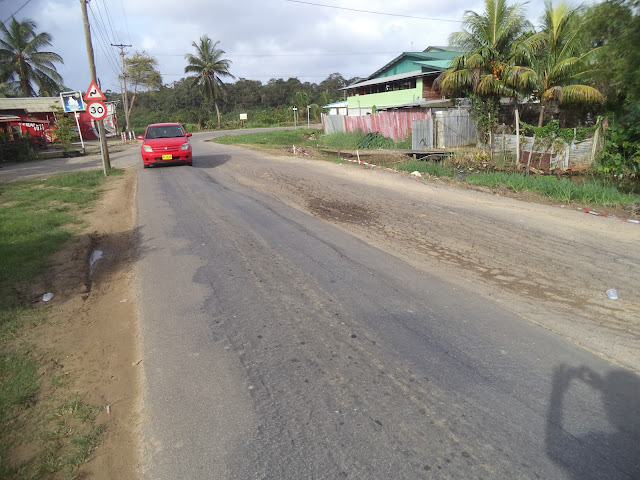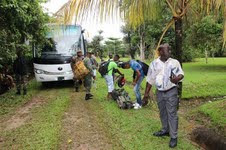Suriname is not an island but it is one of the members of UNASUR and CARICOM and part of the Latin American and Caribbean economic and cultural heritage which is steeped in colonial slavery and indigenous resistance against colonial domination.
(picture original indigenous inhabitants of Suriname)
What most Caribbean islanders don't know about Suriname is that it used to be isolated from the rest of the Caribbean and Latin American mainland due to its location on the South American continent and due to its language barrier, the official language is Dutch.
Thanks to the consistent policies of the Dutch colonizers to keep Suriname focused as servant of the "motherland" in Europe, the kingdom in the Netherlands made good use of Suriname's natural resources.
(Picture Jewish Synagogue in colonial Paramaribo)
Suriname is not an island but most Surinamese feel no connection with the Caribbean and Latin American region as a result of our colonial history and it is only recently that the Surinamese government has been actively promoting regional integration. Since Suriname's independence on November 25th in 1975 and definitely after the February Revolution in 1980 there has been a shifting of the national focus on our neighbors on the Latin American continent and on the Caribbean islands.
(Picture Paramaribo Presidential Palm Gardens)
It is no surprise that what is happening at global level to the Caribbean and Latin American region is also reflected in Suriname, the smallest nation on the American continent. The recent unrest in prominent UNASUR member states Venezuela , Argentina and Brazil did not go unnoticed in Suriname where unions and private sector are feeling the impact of the recent economic recession just as much as their counterparts in UNASUR states. The interesting aspect of this social unrest is however its timing and its clear political support from elite right wing and fascist circles in Latin America and abroad , which seem to have enough funds to finance corrupted officials as seems to be the case in Brazil.
(picture National Flag of Suriname)
Having been focused for centuries on Europe, in particular on the Netherlands where more than 250.000 Surinamese Dutch live, the recent cry 'lets forget about the region and ask help from the Dutch again', is firmly entrenched in old colonial and neocolonial networks of the Dutch and Surinamese dominant elites. The interests of former European colonizers of Latin America and Caribbean and their local counterparts, have shifted. It went from slave trade to cheap and slave labor during colonial times, to modern day exploitation of our natural resources which include timber, aluminum, gold, water, uranium, copper, diamonds, oil and the pristine natural beauty. Our nature and cultural diversity are main attractions for European tourists who wish to escape the harsh European cold climate.
(Picture Opposition Parliamentarian Ronny Brunswijk)
While colonial dominance has instilled a false sense of 'we cannot make it on our own' in the Surinamese psyche, the regional unrest and its economic outfall has given the traditional advocates of colonial world views new impetus to sell us out and corrupt the budding Caribbean and Latin American freedom and independence movements. Brazil is facing impeachment of the democratically elected president , Venezuela is facing foreign intervention and serious economic problems. Suriname has had to bow to the IMF to cope with the loss of foreign currency revenues from exports of Aluminum, gold and oil, due to the dramatic drop in prices of these commodities on the global markets .
(picture Senior Surinamese Citizen)

Suriname is not an island but due to economic recession, social unrest as a result of lack of political unity for change, and serious regional interventions of the right wing elites opting for capitalist protectionism, we might soon be facing the 'island effect' which kept us isolated from our neighbors for so many years. I am convinced that it is a fierce battle ahead in the Caribbean and Latin America in which the advocates of neocolonial submission will be prominently featured and lavishly rewarded for their efforts to satisfy the desires of 1% at the cost of 99%. No need to say that there are some in the 1% who are so filthy rich that they could afford to buy Suriname and make it their private island.
All eyes are on them and their policies, disrupting national cultural and political growth on the islands and on the mainland. Resistance to occupation, domination and economic terrorism needs to be developed and our history of resistance to colonialism needs to be studied to achieve maximum results in the battles ahead.
(Picture Surinamese youths celebrating Independence )

Suriname is not an island but an integral part of the region even if we don't know them as well as we should, and they don't know us as well as they could. The timing of global commodity price drops and political unrest in the region is orchestrated and not accidental. It is time we brace ourselves and face the coming onslaught on our independence, freedom and cultural heritage. Because we are not an island I am convinced Suriname will overcome the current problems and has a bright future ahead in which Latin America and the Caribbean will embrace us warmly.
Martha Tjoe Nij
April 26 2016

































